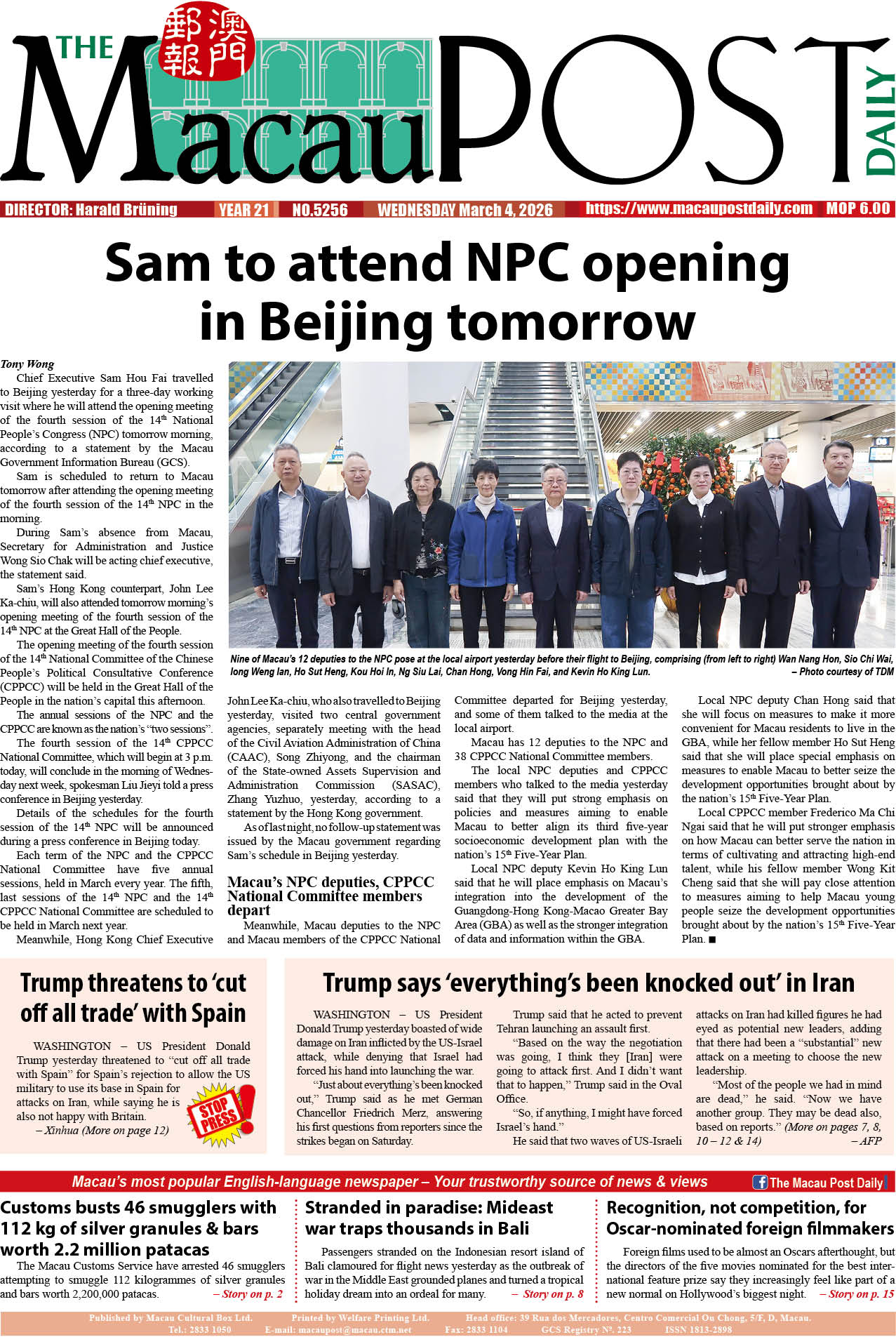Secretary for Social Affairs and Culture Elsie Ao Ieong U said yesterday that in case specific area lockdowns or a citywide lockdown are implemented in Macau and government-support teams are unable to deliver daily necessities to every household, each household would be allowed to send a representative to supermarkets in their respective neighbourhoods to buy basic daily necessities during the lockdown period.
The policy secretary also reaffirmed that the local government has reported to the central government a list detailing the number and types of medical workers who would possibly be needed for the possible occurrence of different levels of COVID-19 situations in Macau under the local government’s worst-case COVID-19 contingency plan. If needed, she said, the local government would ask the central government to provide support to help Macau win its battle against COVID-19.
Ao Ieong made the remarks while speaking to reporters after a presentation session about the government’s contingency plan for a massive COVID-19 outbreak.
The government held the session yesterday at the Macau East Asian Games Dome in Cotai when senior officials presented details of the contingency plan to representatives from social service organisations, schools and the health sector.
The government published early this month the first draft version of its contingency plan for a massive COVID-19 outbreak.
During yesterday’s presentation session, Ao Ieong noted that in case the highly transmissible Omicron variant starts to spread in the community, the number of people infected with COVID-19 will sharply increase. With a huge increase in the total number of people infected with the novel coronavirus, Ao Ieong said, serious cases and death cases will be reported, and their numbers will then continue to rise.
Experiences from HK, Shanghai & Taiwan
Ao Ieong said that the Macau government has learnt from the COVID-19 experiences in Hong Kong, Shanghai and Taiwan, and has designed plans for the possible occurrence of different levels of COVID-19 situations in Macau. Ao Ieong said that the possible implementation of the government’s COVID-19 plan would need civil society’s support, particularly from the social service, education and health sectors. She urged representatives from the sectors to understand the government’s COVID-19 contingency plan and provide training for their staff accordingly.
During yesterday’s session, Health Bureau (SSM) Director Alvis Lo Iek Long said that according to the COVID-19 contingency plan, the local government would impose various citywide COVID-19 prevention measures in case Macau reports new local COVID-19 cases, such as tightened measures for entering and leaving Macau, the closure of certain public venues, school class suspensions, the cancellation of all large events, and a reduced schedule of public buses.
In the next phase, according to the COVID-19 contingency plan, “COVID-19 area control” measures would also be activated for specific areas or neighbourhoods affected by COVID-19. In case “COVID-19 area control” measures are implemented, the affected buildings will be locked down, meaning that residents will be barred from leaving home unless they undergo a COVID-19 nucleic acid test (NAT) and are required to collect daily necessities at designated points in the respective neighbourhoods.
In case Macau is hit by a serious COVID-19 outbreak, according to the contingency plan, the government would impose a citywide lockdown.
In case the government needs to impose an area control lockdown or a citywide lockdown, Lo said, government support teams would be deployed to ensure that all residents have access to daily necessities during the lockdown period.
Lo said that the government will later announce details of its plan for supporting residents’ basic daily life during a possible lockdown period.
Health chief urges residents to learn to conduct rapid tests
Meanwhile, Lo also urged residents to learn how to carry out a COVID-19 rapid antigen test with a test kit themselves now, i.e., at a time when Macau is not affected by COVID-19 transmissions.
Lo noted that rapid antigen tests have been widely carried out in neighbouring regions hard hit by a massive COVID-19 outbreak.
Lo noted that COVID-19 rapid antigen tests enable residents to test themselves for the novel coronavirus using a test kit at home, and the results are normally available in 15 minutes. Rapid antigen tests also enable a lower level of movement of people in the community as residents do not need to leave home to undergo a nucleic acid test (NAT).
However, Lo also underlined that rapid antigen tests are merely supplementary tools to nucleic acid tests, meaning that rapid tests cannot replace nucleic acid tests, because, he said, rapid antigen tests have a lower level of sensitivity (true positive rate) and specificity (true negative rate). Consequently, he said, COVID-19 positive cases of those with a low viral load could possibly not be detected by a rapid antigen test.
During yesterday’s session, Social Welfare Bureau (IAS) President Wilson Hon Wai noted that according to the COVID-19 contingency plan, the local government would activate its home isolation arrangements if Macau has more than 5,000 new COVID-19 patients.
Education and Youth Development Bureau (DSEDJ) Director Kong Chi Meng said that local schools would need to come up with contingency plans for home online classes in case that many residents need to undergo home isolation during a serious COVID-19 outbreak. In this scenario, Kong said, teachers would need to intensively participate in the city’s fight against COVID-19 while continuing to teach their students online.
Meanwhile, Ao Ieong also told reporters that the government was preparing a list of foreign countries that have close relations with Macau and whose nationals could be allowed to enter Macau. She added that Portugal was one of the countries on the list.
With just a few exceptions, foreign nationals have been barred from entering Macau since March 2020, in order to protect the local population from the risk of COVID-19 infection through imported cases.

Secretary for Social Affairs and Culture Elsie Ao Ieong U (centre) is briefed by officials yesterday about the possible operation of an indoor makeshift hospital in the Macau East Asian Games Dome in Cotai. A total of 50 beds have been set up there for a drill, which is now slated to be carried out next month to simulate the activation of the hospital’s operation in case of a massive COVID-19 outbreak. Photo: IAS









